The Year in Review: Celebrating Our Achievements in 2015 Part 2
Part 2 of our "Year in Review" focuses on the hospitals, research institutes and centers that are part of the UF Health family:
- UF Health Cancer Center
- UF Clinical and Translational Science Institute
- UF Institute for Child Health Policy
- The UF Diabetes Institute
- UF Emerging Pathogens Institute
- UF Genetics Institute
- UF Institute on Aging
- Evelyn F. & William L. McKnight Brain Institute
- UF Health Shands
- UF Health Jacksonville
UF Health Cancer Center
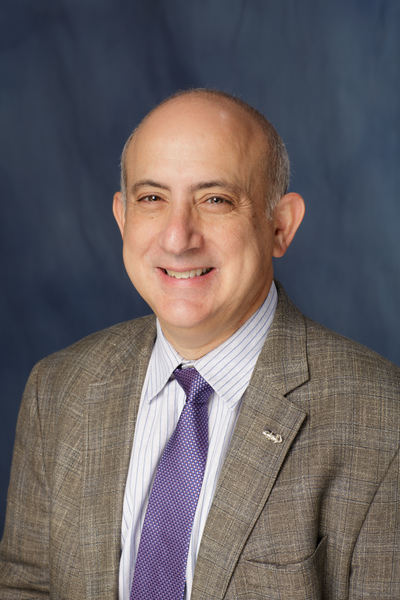 Director: Jonathan D. Licht, M.D.
Director: Jonathan D. Licht, M.D.
The University of Florida Health Cancer Center has undergone substantial change this past year, including recruitment of Jonathan D. Licht, M.D., as the new director. Dr. Licht came to UF from Northwestern University, where, for the past 10 years, he served as chief of the Division of Hematology/Oncology and as an associate director of the Robert H. Lurie Cancer Center. Dr. Paul Okunieff, who has ably led the Cancer Center for the past five years, continues to serve an important role in cancer care and research at the university as chairman of the Department of Radiation Oncology.
Dr. Licht was recruited to UF Health with a goal of obtaining a cancer center support grant from the National Cancer Institute and thereby designation as an NCI Cancer Center. The University of Florida and UF Health are very well-poised to reach this goal. The overall motivation for the development of an NCI-designated center is to bring the best science and technology to the people of north and central Florida to prevent, diagnose and treat cancer. Florida is the third-most-populous state in the nation but has only one NCI Center. UF is a preeminent state educational institution with aligned clinical, educational and research missions. Recurring funds from the state of Florida have been provided to build cancer research programs and support the required infrastructure.
Guidelines from the NCI denote six essential characteristics of a Cancer Center.
- The first of these is physical space to perform cancer research. The Cancer & Genetics Research Complex represents high-quality research space. Minor rehabilitation and optimal use of the space will allow for the recruitment of six to 10 new investigators. In addition, 8,000 square feet of new wet lab bench space is being constructed in the Basic Science Building to be dedicated to cancer research.
- The second characteristic is a structure to organize and promote research. In this regard, new searches for an associate director for basic sciences and an associate director for population sciences in the Cancer Center will launch this winter.
- A third aspect is coordination and collaboration in cancer research. Along these lines, Dr. Licht has begun a UF-wide survey of cancer research and reformulation of cancer research programs into five concept-based programs: CTI — Cancer Therapeutics and Immunotherapy; CMV — Cancer Microbiology and Virology; CCD — Cancer Chromatin Dynamics; CCPE — Cancer Chemistry Physical Sciences and Engineering; and, lastly, CaPSS — Cancer Prevention, Supportive Care and Survivorship. Recruitments and program development in all of these areas are beginning. For example, Dr. Licht’s work on altered gene expression in cancer will augment the CCD program, the recruitment of Dr. Kalpana Ghoshal from Ohio State will add to CTI, and the collaborative work among Dr. Greg Sawyer of the College of Engineering and Drs. Steve Ghivizzani and Parker Gibbs of Orthopedics will exemplify a cross-disciplinary collaboration in CCPE. Dr. Elizabeth Shenkman’s recently awarded $20 million PCORI/One Florida grant to study cancer outcomes across the state, and the studies of cancer pain by Dr. Diana Wilke, R.N., Ph.D., a preeminent recruit in the College of Nursing, will help anchor the CaPSS program.
- Recruitment of established and highly promising cancer investigators into these programs will strengthen UF’s cancer focus — the fourth characteristic of an NCI center. Additional ways to spur cancer focus and to serve our community included a joint retreat with the Institute on Aging research and the awarding of several pilot grants to spur basic and population science research at this interface.
- UF preeminence funds across the campus, substantial philanthropic support and UF Cancer preeminence funds represent the institutional commitment to Cancer Research — the fifth element of the NCI criteria for a cancer center.
- As Cancer Center director, Dr. Licht will work with all units of the College of Medicine, the Health Science Center and the other colleges of the university to bring these efforts together, which will fulfill the sixth criteria for our selection by the NCI.
To aid in our quest, Dr. Licht has assembled a distinguished team of outside advisors representing directors and associate directors of NCI-funded cancer centers. This group will meet in February to learn of the Cancer Center’s present status and future plans, and to provide feedback and guidance.
A robust portfolio of clinical trials, particularly those developed from the science of UF investigators, is an important component of an NCI-designated cancer center. In this regard, under the supervision of Dr. John Wingard, associate director for clinical research, and Brian Sevier, associate director of the Clinical Trials Office, the opening of clinical trials will be streamlined through the use of central and cancer-focused IRB panels, and by fully implementing electronic case reporting forms using the OnCore software technology platform, a capability soon to be shared with the CTSI. Furthermore, under the leadership of medical oncologist Dr. Thomas George and Dr. Carmen Allegra, chief of the Division of Hematology/Oncology, an Experimental Therapeutics Incubator will be developed to facilitate investigator-initiated clinical trials with the build-out of infusion chairs dedicated to research in the UF Health Davis Cancer Pavilion and the recruitment of research nurses and pharmacists.
NCI-designated cancer centers must reach out to educate clinicians, scientists and the public, including underserved populations. In this regard, the collaboration of the UF Health Cancer Center with HealthStreet under the leadership of Dr. Linda Cottler to encourage enrollment of underrepresented minorities in clinical trials will continue. The MiCART program led by Drs. Folakemi Odedina and Yehia Daaka exemplifies our aim to diversify the workforce of those dedicated to cancer research. Under the leadership of Dr. Dietmar Siemann, a new curriculum in Cancer Biology for Ph.D. candidates has been initiated.
NCI-designated cancer centers develop networks for clinical research activities. Therefore, collaboration with the UF Health Proton Therapy Institute under the leadership of Dr. Nancy Mendenhall and with the UF Health Cancer Center – Orlando Health led by Dr. Mark Roh will continue, with plans to expand clinical research in Gainesville, Jacksonville and Orlando while coordinating outstanding patient care that takes advantage of expertise at all sites. Working with our faculty, staff and patient advocates, Dr. Parker Gibbs, associate director for medical affairs, is maintaining a sharp focus on continuously improving the patient care experience for individuals being treated for cancer at UF Health.
In summary, the University of Florida Health Cancer Center is ready to lift off for a new phase of growth and development. Our goal is clear, our plan is coming into focus and our tactics are already beginning to show results.
Clinical and Translational Science Institute
 Director: Dave Nelson, M.D.
Director: Dave Nelson, M.D.
The CTSI continued to serve as a catalytic hub for translational research by leading transformative programs, providing services and resources for research teams, and offering a range of training, collaboration and community engagement opportunities. The CTSI served more than 1,000 investigators in 2015.
In August, the CTSI was awarded $17.5 million in renewed funding through the National Institutes of Health’s Clinical and Translational Science Award program. The four-year award allows the CTSI to build on UF’s strengths to chart new pathways for translational workforce development, embed translational science in health systems and physician practices, expand statewide collaborations, and accelerate the collective impact of the national CTSA network. Dr. Nelson, CTSA UL1 principal investigator and assistant vice president for research at UF, leads the new award in collaboration with Betsy A. Shenkman, Ph.D., CTSI co-director and chair of the department of health outcomes and policy in the UF College of Medicine; Thomas A. Pearson, M.D., Ph.D., M.P.H., CTSA KL2 principal investigator and executive vice president for research and education at UF Health; and Wayne McCormack, Ph.D., CTSA TL1 principal investigator and a professor in the UF College of Medicine.
CTSI accomplishments reflect the dedication of hundreds of faculty, staff and students from across the university and at partners throughout the state, including Florida State University, which joined the UF CTSI as a community research partner on the NIH award.
Transformation
CTSI efforts to transform the research environment continued to gain momentum with an emphasis on learning health system initiatives and multisite study capacity.
Learning Health System Initiatives:
- Precision Medicine: Developed within the CTSI and led by UF College of Pharmacy faculty, the UF Health Personalized Medicine Program continued to develop, implement, study and refine methods that allow genetic information to be used as a routine part of patient care. At the American Heart Association’s Scientific Sessions in November 2015, the program presented findings that genotype-guided antiplatelet therapy improved outcomes for percutaneous coronary intervention patients at UF Health Shands Hospital.
- Clinical Metabolomics: As part of the new CTSA, the CTSI’s Southeast Center for Integrated Metabolomics launched a collaboration with UF Health Pathology Laboratories to develop new diagnostic applications of metabolomics.
- Consent2Share: In 2015, UF Health began a phased, systemwide rollout of the CTSI’s Consent2Share program, which offers patients an opportunity to allow UF researchers to contact them about research studies for which they might be eligible based on information in their electronic health record. The program was recognized by the Association of American Medical Colleges with a 2014 Learning Health System champion award and was featured at the AAMC Learning Health System Research Awards meeting in February 2015. To date, more than 24,000 patients have agreed to participate in Consent2Share.
Multisite Study Capacity:
- University of Florida: In August 2015, the UF Office of Research formed a Human Subject Research Task Force to improve the effectiveness, efficiency and impact of human subject research at UF. Led by Dr. Nelson, the task force examined all aspects of human subject research at UF and is finalizing recommendations for process improvement initiatives to begin in 2016, including research infrastructure, access to participants, and regulatory requirements that are crucial to the success of multisite trials.
- Statewide: In 2015, the CTSI-led OneFlorida Clinical Research Consortium received a Clinical Data Research Network funding award from the Patient-Centered Outcomes Research Institute to develop the OneFlorida Data Trust and statewide research infrastructure.
- National: In 2015, the CTSI and 12 other CTSA hubs completed the first phase of the national CTSA Accrual to Clinical Trials project, which is creating a federated network to enable multisite cohort exploration and recruitment using i2b2/SHRINE technologies. The CTSI also joined the implementation phase of the Child Health Research Acceleration through Multisite Planning, or CHAMP, collaboration, which involves 15 CTSA hubs.
Research Services & Resources
The CTSI Service Center helped research teams navigate the UF research landscape, connect with potential collaborators and access CTSI services. The CTSI launched several new services in 2015, including developing a CTSI Recruitment Center and establishing new capabilities for the CTSI Investigational Drug Service located in the Clinical Research Center, which acquired a Level 2 Biosafety Cabinet to assist with preparation of gene therapy and cellular products.
The CTSI continued to support ongoing pilot programs and develop new pilot programs, with three new RFAs being finalized for release in the spring of 2016. In addition, the CTSI expanded its studio series to include Integrated Data Repository studios as well as “on-the-road” Implementation Science Studios for clinicians.
Education, Collaboration & Engagement
Education: The CTSI Translational Workforce Development Program expanded its role as a hub for translational science training at UF Health, including the launch of a new “K College” and “T Team” to support and convene K and T scholars across colleges. In 2015, the CTSI welcomed approximately 15 new scholars across its KL2, TL1 and TRACTS programs, as well as 16 new members of the CTSI Mentor Academy. New academic programs launched in the fall include an Educational Scholarship Program and a graduate certificate in biomedical informatics. In addition, the Center of Excellence for Regenerative Health Biotechnology joined the CTSI TWD Program.
Collaboration: The CTSI launched a Network Science Program to study and guide the maturation and integration of the UF CTSI and larger CTSA scientific collaboration networks. Led by faculty in the College of Liberal Arts and Sciences, the program will build on existing research to enhance team science and multidisciplinary collaboration at UF and nationally.
Engagement: The CTSI Implementation Science Program created training materials for its Citizen Scientist Program, which recruited, hired and provided training and support to enable 12 patients and community members to serve as collaborators throughout the research process. The CTSI’s HealthStreet program further developed the Our Community, Our Health series into a national multisite forum that uses livestreaming, text messaging and social media to engage researchers and community members in open dialogue. In addition, HealthStreet received two grants to extend its community health worker outreach beyond Alachua and Duval counties.
Institute for Child Health Policy
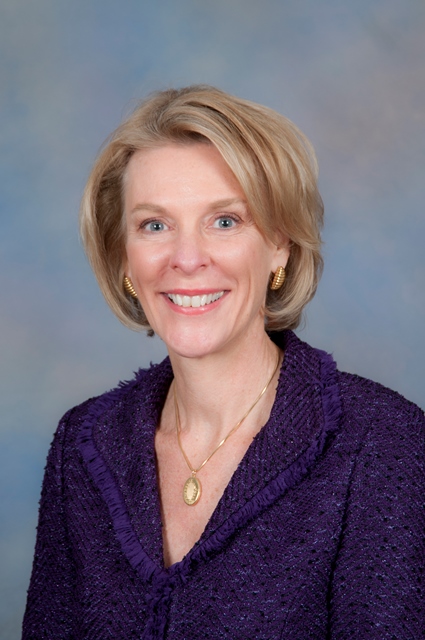 Director: Betsy A. Shenkman, Ph.D.
Director: Betsy A. Shenkman, Ph.D.
In 2015, the Institute for Child Health Policy capitalized on new academic strengths and synergies to gain increased national prominence in pediatric translational research and to expand its statewide collaborations.
National and Statewide Momentum
Building upon years of research in children’s health, pediatric cancer outcomes and health disparities among vulnerable populations, Betsy A. Shenkman, Ph.D., was appointed to serve as national co-chair of the Patient-Centered Outcomes Research Institute’s Pediatrics Cross-Cutting Research Group. The group will help to set PCORI’s national priorities for pediatric research across the entire clinical data research network — PCORnet, which seeks to link patients, health care systems, clinicians and researchers to accelerate the translation of findings into patient-centered care. Shenkman also will serve as a member of the 30-person Research Committee, which will help set the national research agenda for PCORnet.
The OneFlorida Clinical Research Consortium, which is dedicated to conducting community-based pragmatic clinical trials and implementation studies across the lifespan, received a $7.9 million funding award from PCORI to become one of 13 clinical data research networks nationwide. William Hogan, M.D., M.S., ICHP faculty member and director of biomedical informatics at the UF CTSI, and Betsy A. Shenkman, Ph.D., who also co-directs the UF CTSI, serve as the principal investigators for the funding award and play a strategic leadership role within the consortium. Already ICHP investigators like Ramzi Salloum, Ph.D., and Stephanie Staras, Ph.D., are using the consortium and its clinic and patient network for their pediatric studies, including one on tobacco cessation among adolescents diagnosed with cancer and an NCI-funded study on HPV prevention, respectively.
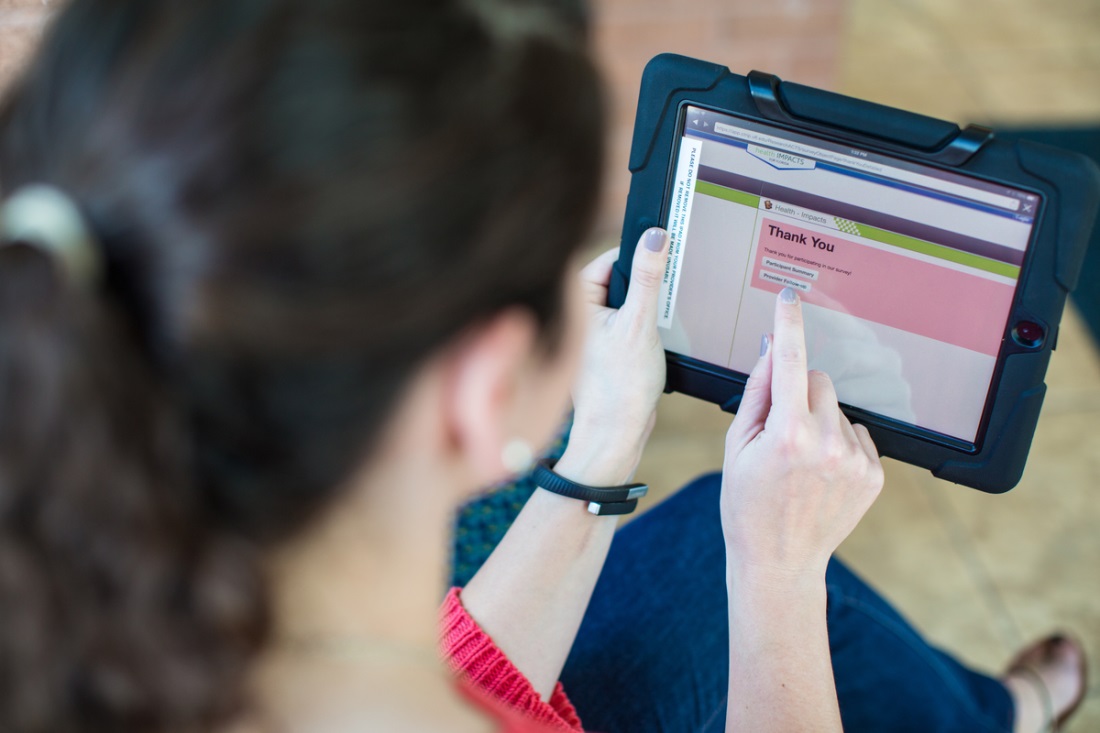
ICHP biostatistician Keith Muller, Ph.D., and University of Colorado Denver co-principal investigator Deborah Glueck, Ph.D., have received NIH funding to develop and offer a course on how to calculate power and sample size for multilevel and longitudinal studies, which are typically used for following cohorts of children in nested relationships, such as schools or clinics.
In addition to these new national opportunities, the institute continued to expand its statewide collaborations examining quality and outcomes of care for high-risk populations. For instance, the institute holds several competitive awards to evaluate Florida’s Medicaid programs for the quality and outcomes of care for children who are the most vulnerable due to their income, poor health status and racial/ethnic minority status. In addition, Mildred Maldonado-Molina, Ph.D., and Chris Delcher, Ph.D., have growing portfolios examining Florida data related to maternal and child health, including a new partnership with the March of Dimes that mapped premature births throughout the entire state and identified “hot spots” in need of additional resources. The institute also continues to grow its statewide collaborations around oral health research with a grant from the NIDCR, which will examine the feasibility of implementing health risk assessments in dental practices across the state.
Finally, the five-year, NIH-funded collaborative community-based trial with Cherokee Nation Behavioral Health in Oklahoma and several institute faculty members, including Kelli Komro, Ph.D., and Alexander Wagenaar, Ph.D., has ended its active intervention phase among Native American and other youth living in rural, high-risk communities. Preliminary findings are positive, with a community-based intervention showing much promise in reducing adolescent alcohol consumption.
Growing Research Synergies
The Institute for Child Health Policy also enjoyed tremendous growth in 2015, with 12 new faculty joining the institute as well as strengthening collaborations with the Department of Pediatrics, the Diabetes Institute and the Anita Zucker Center for Early Childhood Studies. Several of the additions created new research synergies between existing areas of academic strength, such as pediatric intervention design and health outcomes analysis, and the fields of biomedical informatics, early childhood and maternal health, and childhood nutrition and obesity.
William Hogan, who joined UF in June 2014, spent the year building a dynamic team of diverse biomedical informaticians with expertise in electronic health records data, mHealth, research data management, ontology and data security. Collaborating across UF Health and the state, the team will provide crucial expertise in the creation of computable phenotypes for obesity, hypertension and rare pediatric diseases, such as Duchenne muscular dystrophy, as well as in data security and the development of mobile health-related applications. In addition, the institute welcomed new faculty with expertise in child obesity and nutrition, tobacco cessation, and child and maternal health.
Building upon its expertise in biostatistics and the design of pediatric clinical and observational studies, the institute also welcomed Matthew J. Gurka, Ph.D., as the institute’s new associate director. Gurka, who was hired as part of UF Preeminence, brings with him a National Heart, Lung and Blood Institute R01 to fund his research on better ways to measure the severity of a person’s metabolic syndrome, which affects one in three adults and a growing number of children. Gurka also will work closely with members of the Anita Zucker Center for Early Childhood Studies to examine intersections between children’s health, learning and development as well as with Lindsay Thompson, an associate professor in the department of pediatrics and the institute’s assistant director of clinical research, to continue to strengthen the institute’s clinical collaborations across the university and statewide.
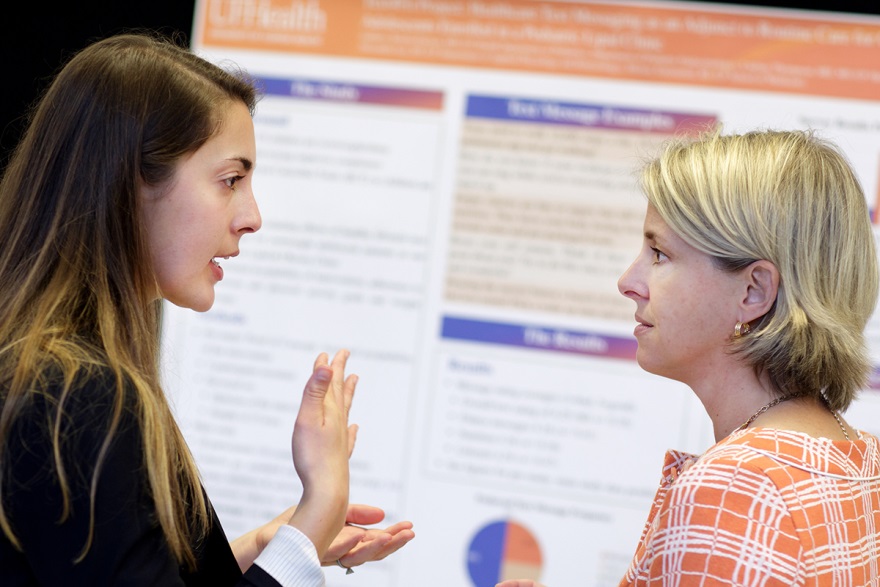
In addition to providing a collaborative space for child health researchers across UF’s campus, the institute’s faculty members have expanded their diverse funding portfolio with a total of $41.4 million in newly garnered grant funding in fiscal year 2014-15 and an additional $10 million to fund lifespan research through the department of health outcomes and policy. ICHP faculty also continued to increase their research productivity with 111 publications in the past fiscal year.
The UF Diabetes Institute
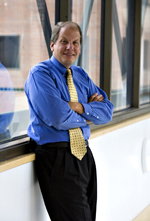 Director: Mark Atkinson, Ph.D.
Director: Mark Atkinson, Ph.D.
2015 represented a key point in the history of the diabetes program at UF, as it represented its first year as an official “institute.” This recognition was given not only for the highly regarded diabetes research and clinical programs at UF Health, but also for efforts throughout our campus and across the state.
As a result of the hard work, intellect and impressive efforts of our institute’s members (both faculty and staff), the UF Diabetes Institute continues to make ever-increasing progress toward its goals directed at impacting diabetes.
Those noteworthy in 2015 include:
- A Diabetes Institute-affiliated department, Pediatric Endocrinology, was the highest-ranked clinical program at UF Health and in the state of Florida, and in the Top 15 nationally (U.S. News & World Report, 2015).
- Diabetes Institute faculty generated more than $20 million in research funding from a variety of federal and state agencies, foundations and industrial concerns.
- Our program remained the world’s top recipient of research funding from JDRF, the world’s largest non-governmental agency providing funds dedicated to Type 1 diabetes.
- The medical director for the Diabetes Institute, Dr. Desmond Schatz, was named president of the American Diabetes Association. The ADA is the country’s largest nongovernmental effort dedicated to improving the lives of those with diabetes in all forms, operating through improved education, advocacy and research.
- Dr. Michael Haller was named division chief of Pediatric Endocrinology. He took the helm of a nationally ranked division that was led for 21 years, in impressive fashion, by Dr. Janet Silverstein.
- Dr. Ashby Walker, from UF’s Department of Health Outcomes and Policy, published results from a multi-year effort where 40 adolescents were provided disposable cameras and asked to take pictures about what diabetes means to them. They discovered key differences in adolescents of different genders and socioeconomic classes that could shape patient care and diabetes education.
- Dr. Anastasia Albanese-O’Neill, from UF’s Department of Nursing, helped organize and publish new guidelines for diabetes care in school settings, forming the ADA’s position statement on this matter.
- The institute welcomed a new administrative director, Ms. Carly Barnes, replacing Mr. Les Jebson, who had carefully crafted the program from its inception.
- In October, a Global Impact Assessment of UF campuswide efforts poised to have a major impact on the future noted five projects having the most promise, two overseen by UF Diabetes Institute members (Dr. Michael Haller for Diabetes Cure; Dr. Harry Klee from UF IFAS for improving crops through genetic investigations).
- JDRF nPOD, the world’s largest open repository of pancreatic tissues from individuals with Type 1 diabetes and located at UF, surpassed its $20 million level in cumulative funding. Beyond this, it surpassed the 100th peer-reviewed publication mark and received $3 million in additional funding from the Leona M. and Harry B. Helmsley Charitable Trust.
- With funding from a new $4 million NIH grant, UF grew in its role as being the academic institution having the most funded programs (5 of 22 total awards) in the NIH Human Islet Research Network program.
- A series of clinical initiatives seeking to improve care throughout UF Health Shands Hospital and our outpatient clinics were initiated, under the direction of Dr. Kenneth Cusi, adult medical director of the Diabetes Institute. This effort, the Diabetes Care Task Force, was created in a joint cooperation with UF Health Shands Hospital.
Indeed, highlighting the advancements that have occurred with respect to Type 2 diabetes since the recruitment of Dr. Cusi to the University of Florida some three years ago deserves special, stand-alone recognition:
- During this time period, the adult Division of Endocrinology in the Department of Medicine has grown from five endocrinologists to 15 (13 full-time, two part-time) and from none to six nurse practitioners.
- The division has also recruited three additional endocrinologists who will be joining by June 2016. This makes it the largest adult endocrinology program in Florida.
- The Adult Endocrinology Division is projected to have 12,000 patient visits in this academic year (from ~3,000 in 2012), ≥60% having a diagnosis of diabetes. Division staff members also see nearly 7,000 individuals at the Malcom Randall Veterans Affairs Hospital.
- In the inpatient setting (i.e., UF Health Shands Hospital), interactions with adult endocrinologists have increased from 360 encounters/year (2012) to more than 5,500 in this academic year.
- In terms of training, the Endocrine fellowship has grown from two to five fellows and will have six in 2016, ranking second to the University of Miami (total of eight). This past year, the program received 160 applications for these positions.
- In response to the revolution in state-of-the art methodologies to assess metabolism, UF (in cooperation with the CTSI and AMRIS) established a series of never-before-seen procedures on our campus. These include the euglycemic insulin clamp with stable isotopes and indirect calorimetry, as well as imaging techniques to measure liver/cardiac fat as well as in vivo hepatic functional changes.
- Lastly, in 2015, the UF Division of Endocrinology, Diabetes & Metabolism of the Department of Medicine received the best ranking it has ever received (#28) from U.S. News & World Report.
Dr. Atkinson notes that “this last facet is especially noteworthy as one of the key hopes for the UF Diabetes Institute was to see growth, including that of national recognition, in its Type 2 diabetes and obesity programs. While the Type 1 programs have long received such accolades, it is important for everyone associated with UF, be they faculty, staff, patients or their families, to care about diabetes in all of its forms. Why?
- 29.1 million Americans have some form of diabetes
- 86 million Americans are prediabetic
- Seventh-leading cause of mortality in the United States
- $245 billion for diagnosed diabetes care
- People with diabetes have medical expenses 2.3 times higher than people without the disease
- The Centers for Disease Control and Prevention reports 1 out of every 10 clinic visits nationally are now diabetes-related
- 1.74 million adults (10% of the Florida population) have diagnosed diabetes; an additional 843,000 remain undiagnosed
- 1 out of every 4 patients admitted to a UF Health Shands hospital last year had diabetes as part of their diagnoses
- North Central Florida has the highest prevalence of diagnosed diabetes in the entire state
- Diabetic expenses in Florida totaled $18.9 billion in 2013
With approximately 100+ faculty members from the colleges of Engineering, Medicine, Nursing, Pharmacy, Public Health and Health Professions, and Veterinary Medicine as well as the Institute of Food and Agricultural Sciences, the Institute on Aging, the UF Genetics Institute, and more, Dr. Atkinson and his colleagues are creating a diabetes institute that is unique among other diabetes centers/institutes at a national level. In particular, the UF Diabetes Institute membership leverages a remarkable degree of intellectual breadth and depth in all facets of the disease — uniting innovative patient care, empowering self-management education and providing for new opportunities in research, prevention and treatment of the various manifestations of this disease.
For additional events and milestones that occurred with respect to institute faculty or to learn more about this new program, please visit http://diabetes.ufl.edu/research/newsbriefs/.
Emerging Pathogens Institute
 Director: J. Glenn Morris, M.D.
Director: J. Glenn Morris, M.D.
During 2015, EPI has continued to build its research portfolio in emerging pathogens/infectious diseases, further enhancing UF’s reputation as a top national and international center for infectious diseases research. In the aftermath of Ebola, there has also been a strengthened emphasis on global health, reflecting the importance to Florida (and the United States) of understanding why pathogens emerge, and are transmitted, at a global level.
- EPI investigators have continued to play a key role in the characterization and control of Ebola. Dr. Ira Longini (PHHP/COM), working under the auspices of the World Health Organization, played a crucial role in the design and analysis of the rVSV-ZEBOV Ebola vaccine trial recently reported in The Lancet. Using a highly innovative ring vaccination design, he and his colleagues demonstrated that the vaccine had 100% efficacy in prevention of the disease, a major step forward in long-term control of this disease. In separate studies, published in Nature’s Scientific Reports, Dr. Marco Salemi (COM) and his group were able to show that the evolution of the virus was characterized by neutral genetic drift, providing reassurance that we were not seeing emergence of new, highly virulent strains.
- EPI, building on teams of faculty and student collaborators from PHHP, COM, Vet Med, IFAS, Engineering and other colleges, has continued to enhance its research base in Haiti, permitting direct study of a number of tropical diseases (including diseases for which Florida may be at risk). Current studies include work on vector-borne transmission and clinical characteristics of dengue, chikungunya and Zika virus (Drs Okech [PHHP], Lednicky [PHHP], Salemi [COM], and others), multi-drug-resistant tuberculosis (Dr. Lauzardo [COM]), cholera transmission and evolution (Drs. Ali [PHHP], Johnson [COM], Salemi [COM], Morris [COM] and others), malaria (Drs. Okech [PHHP], Dame [Vet Med] and Canella [COM]), and sexually transmitted infections (Dr. Maurelli [PHHP]); these studies are linked with work on sanitation, water systems and nutrition. Of note, Drs. Morris and Bardoch (COM, Vet Med) were the recipient of a Bill and Melinda Gates Grand Challenge Award for a project focused on the development of community-based programs that integrate current national efforts to eliminate cholera, malaria and lymphatic filariasis; this is the first Gates Grand Challenge award to be received by a UF investigative team.
- EPI continues to be a leader nationally and internationally in the field of foodborne illness. Dr. Arie Havelaar, a faculty member hired under UF Preeminence (IFAS), has led the WHO-sponsored Foodborne Disease Burden Epidemiology Reference Group to study global variation in the impact of foodborne disease. In a series of papers that appeared earlier this year in The Lancet and Lancet Infectious Diseases, they reported that 31 foodborne hazards caused 600 million foodborne illnesses and 420,000 deaths in 2010. Results from the study indicate that up to 33 million healthy life years are lost each year due to foodborne diseases.
- In the Gainesville area, EPI continues to provide technical assistance for the school-based influenza immunization program, a model program recognized nationally that has resulted in immunization of over 50% of Alachua County students. In other influenza-related work, Drs. John Lednicky (PHHP) and Nicole Iovine (COM) and colleagues have also looked at the impact of genetic drift on clinical characteristics of influenza patients at UF Health Shands Hospital and in the community.
- A number of new faculty members have joined EPI during 2015, including two hires under the UF Preeminence initiative. Dr. Derek Cummings (Department of Biology, CLAS), an expert in modeling of influenza, dengue and other viral diseases, will further enhance the modeling capabilities at EPI. Dr. Anthony Maurelli (Department of Environmental and Global Health, PHHP) will bring added expertise in bacteriology and global health.

- Reflecting the diversity of research at EPI, a selection of other 2015 publications from EPI investigators include “Spatiotemporal expansion of human rabies and its probable expansion in mainland China” (Dr. Yang [PHHP/COM] and colleagues, PLoS Negl Trop Diseases); “Phylogenomic characterization of California sea lion adenovirus-1” (Drs. Waltzek [Vet Med], Salemi [COM] and colleagues, Infect Genet Evolution); “Potential effects of diurnal temperature oscillations on potato late blight with special reference to climate chance” (Dr. van Bruggan [IFAS] and colleagues, Phytopathology); “Identification of an avian polyomavirus associated with Adelie penguins” (Dr. Varsani [IFAS] and colleagues, J Gen Virol); “A Burkholdaria pseudomallei colony variant necessary for gastric colonization” (Drs. Schweizer [COM], Tuanyok [Vet Med] and colleagues, mBio), “Three Gorges dam: impact of water-level changes on the density of schistosome-transmitting snail Oncomelania hupensis in Dongting Lake area, China” (Dr. Liang [PHHP] and colleagues, PLoS Negl Trop Diseases), and “Bacillus anthracis diversity and geographic potential across Nigeria, Cameroon, and Chad: further support of a novel West Africa Lineage” (Dr. Blackburn [CLAS] and colleagues, PLoS Negl Trop Diseases).
UF Genetics Institute
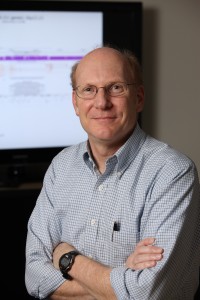 Director: Patrick Concannon, Ph.D.
Director: Patrick Concannon, Ph.D.
It has been another year of growth at the University of Florida Genetics Institute. During 2015, we welcomed another five faculty members, bringing the total to 242. UFGI members represent seven colleges and 49 academic departments. Over the year, they brought in $89 million in sponsored research support, filed 61 U.S. patents and published 932 scholarly articles. Their work appeared in prestigious journals such as The New England Journal of Medicine, Science, Nature and Nature Genetics.
Mission
The aim of the UFGI is to promote excellence in the areas of genetics and genomics at the University of Florida by: (1) building community, facilitating collaboration and creating opportunities for intellectual exchanges among investigators working in diverse taxonomic systems but with a common set of approaches in genetics and genomics, (2) supporting recruitment and retention of outstanding faculty in the areas of genetic and genomics, (3) supporting graduate education in the areas of genetics and genomics and (4) enhancing the ability of researchers at the University of Florida to compete for multidisciplinary research grants in the area of genetics and genomics.
Education
The Genetics & Genomics Graduate Program has been a particular source of pride for Dr. Concannon and his colleagues. Last year saw three students earn their doctoral degrees, bringing the total number of graduates to 20. Our intercollegiate program continues to grow, with seven more students admitted in the current year and interviews already underway for the class of 2016. This year the Kenneth I. Berns Excellence in Genetics Award was introduced: it was awarded to Heather Rose Kates, a Genetics & Genomics graduate student, in recognition of a video highlighting her research that appeared on Voice of America’s website “Scientists Go To Extremes to Save Food Crops’ Wild.”
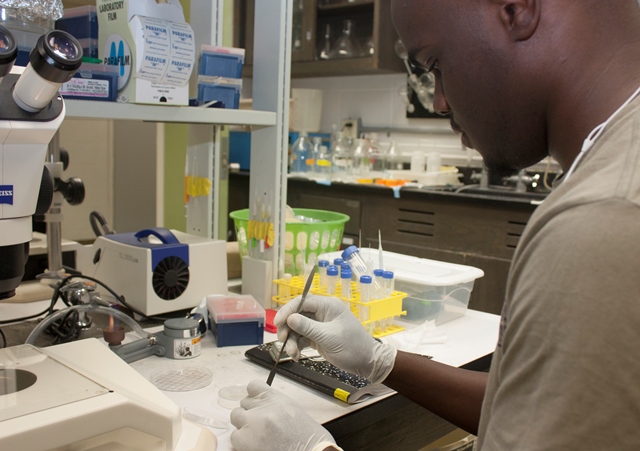 Reflecting the graduate program’s commitment to preparing students for a wide range of career options, two Genetics & Genomics graduate students were recognized for entrepreneurship in 2015. Tatiana Salazar won the UF Big Idea Competition for her veterinary medical startup company, StemPoint. Marcio Resende received the Governor’s Young Entrepreneur Award from Gov. Rick Scott in honor of his company RAPiD Genomics.
Reflecting the graduate program’s commitment to preparing students for a wide range of career options, two Genetics & Genomics graduate students were recognized for entrepreneurship in 2015. Tatiana Salazar won the UF Big Idea Competition for her veterinary medical startup company, StemPoint. Marcio Resende received the Governor’s Young Entrepreneur Award from Gov. Rick Scott in honor of his company RAPiD Genomics.
Outreach
The 2015 program of the UF Genetics Institute’s annual cornerstone event, The Florida Genetics Symposium, was the most successful yet. Taking place Nov. 18-19, 2015, more than 400 people registered to attend — the most participants in the history of the event. It featured a keynote address from Ian Baldwin, Ph.D., founding director of the Max Planck Institute for Chemical Ecology. A member of the National Academy of Sciences, Baldwin is internationally known for his groundbreaking scientific work on the complex interplay between genetics, the environment and pathogens, and how these factors influence the survival of plants in the wild. The conference also featured nearly a dozen other distinguished speakers, both from UF and other institutions. More than 130 posters were presented, with student and postdoctoral associates receiving awards for best poster presentations.
Continuing our collaborative efforts with innovative faculty at other institutions, we expanded our weekly seminar series with presentations from 18 external speakers. The invited speakers reflect the broad, multidisciplinary mandate of the UF Genetics Institute. The seminars included outstanding investigators from the fields of Bioinformatics, Genomics and Cell Biology working on a variety of different species and model systems.
In August, UFGI hosted the second annual Phenotype Prediction Workshop. The objective of this workshop was to present recent results and theoretical developments of statistical models used to predict the phenotype of complex traits using genomic data. Presentations included studies from humans, trees, crops and livestock. The workshop attracted more than 130 on-campus participants, and was streamed live to 549 online attendees from more than 50 countries.
Other outreach endeavors included organizing the first UFGI DNA Day event on the UF campus. The April celebration featured activities and contests marking the anniversary of the elucidation of the structure of the DNA molecule.
Expanding into the community, six UFGI faculty members gave public lectures at the Oak Hammock retirement community as part of a course titled “Advances in Genetics.”
Institute on Aging
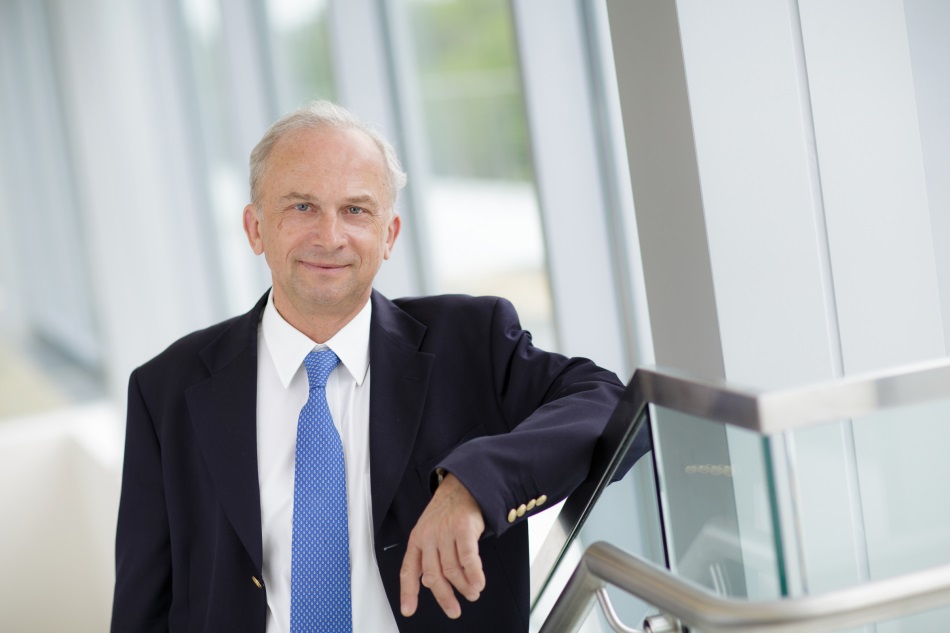 Director: Marco Pahor, M.D.
Director: Marco Pahor, M.D.
2015: Feb. 1, 2015 marked the first decade of the University of Florida Institute on Aging. It was a decade of organization, development and growth. Now, we are striving to further develop our strengths in all areas of the academic mission, including research, education and health care in synergy with UF colleges, institutes, centers and departments. We aim at fully embracing the new UF Health Strategic Plan for 2015-2020 – The Power of Together.
Research
The year 2015 was extremely successful regarding research grant funding. The IOA has supported 54 extramural grants through cores, pilots and mentoring, with a total cost of over $153.2 million, and $23 million in the 2015 annual period, which include major center grants, such as the Pepper Center, the P50 Sepsis project and the IOA contribution to the CTSI KL2 program, as well as large NIH funded multicenter clinical trials, including the LIFE study, The Testosterone Trials, ASPREE and the newly awarded ENRGISE described below. Of the 54 active grants, 15 were newly funded in 2015, and eight were NIH training grants (K and T32 grants). In addition, the Cognitive Aging and Memory – Clinical Translational Research Program, or CAM-CTRP, initiated the McKnight Inter-Institutional Neuroimaging and Cognitive initiatives to establish normative databases for successful cognitive aging in people over 85 years. Other CAM-CTRP funded grants include the P30 project to examine the effects of alcohol reduction in HIV-positive adults as a function of aging, the R56 project to investigate the effects of increased perfusion via cardiac resynchronization therapy in heart failure on brain function, and the R01 grant to examine the effects of weight loss via bariatric surgery on diabetes and brain function.
The IOA also has a very rich portfolio of 41 pending grants (total cost: $70.7 million) that have benefited from IOA support, and 12 additional grants in preparation.
The ENRGISE Study
UF received a new award that is part of an NIH multicenter clinical trial to study inflammation and mobility. As people age, they almost always develop chronic, low-grade inflammation throughout their bodies. The University of Florida IOA, along with the Wake Forest School of Medicine and four other institutions, has received a three-year, $5.3 million grant to study whether reducing this inflammation could help avert mobility decline in older adults.
Based on IOA’s long-term observational studies, it is known that low-grade chronic inflammation is a risk factor for disability, impaired mobility and slower walking speed. The newly funded pilot study, called Enabling Reduction of Low-Grade Inflammation in Seniors, or ENRGISE, will test whether fish oil and the blood pressure drug losartan, which have been shown to lower inflammation, could help improve physical function in older adults. Dr. Pahor and Dr. Ambrosius at the Wake Forest School of Medicine are co-principal investigators of the study.
The levels of inflammation under study are way below the traditional levels of inflammation that one can observe during an acute infection such as pneumonia or sepsis. These are much lower, chronic, levels that are associated with aging but not always disease. Recruitment is planned for 300 older adults who are at risk for, or already have, mobility impairment, depending on the person’s walking speed and self-reported mobility difficulty. The study will include participants who have elevated levels of interleukin 6, the cytokine most consistently associated with difficulty in mobility. The study’s goal will be to determine whether fish oil and losartan can have an impact on interleukin 6 and walking speed.
Over the past 20 years, Dr. Pahor and his collegues have investigated the connection of these proteins associated with inflammation, particularly interleukin 6, plasma C-reactive protein and tumor necrosis factor alpha, and disability in adults. The question now being asked is whether reducing the level of these proteins will maintain older people’s physical function and mobility, prevent mobility disability and ultimately maintain independence.
The research builds upon the Lifestyle Intervention and Independence for Elders, or LIFE, study, a trial and previous partnership between UF and Wake Forest, among six other field centers. By studying a nutritional and pharmaceutical intervention for reducing inflammation, it is hoped that such interventions could ultimately target inflammation in a manner that preserves the ability of people to walk. The ultimate goal of this research is to develop therapies that can preserve people’s ability to walk and live independently.
Thus, if successful, the ENRGISE pilot study will lead to a much larger, definitive multicenter clinical trial to test whether reducing chronic low grade inflammation may prevent major mobility disability in older persons.
Main Research Findings. The past year has been extremely rich in research findings with over 245 papers published in peer-reviewed journals by IOA investigators. Below are a few examples.
- Sedentary time. We continued the analyses of the LIFE Study and found that not only the amount of physical activity, but also sedentary time, independently of the amount of physical activity performed, is important for a person’s health. In fact, sedentary time is positively associated with predicted 10-year coronary heart disease risk and with a higher risk of metabolic syndrome.
- Frailty. The frailty syndrome, characterized by slow walking speed, sedentary behavior, low muscle strength, fatigue and unintentional weight loss, is a well-established condition of risk for disability in older persons. In the LIFE study we found that regular structured physical activity (primarily brisk walking and resistance exercises) reduced frailty, especially in individuals at higher risk of disability.
- Rapamycin. A few years ago we published in Nature a seminal study showing for the first time that longevity could be pharmacologically expanded in mammals with the anticancer drug rapamycin. Since then the research in that direction has soared worldwide, looking at mechanisms by which rapamycin works and at developing at analogues that would be less toxic and applicable in humans. We recently found in aged rats that rapamycin results in preserved mobility and normalizes serum leptin by reducing obesity and leptin synthesis.
Patient Care
Clinical practice in the elderly population continues to expand, achieving a 24% growth rate of the outpatient practice, and an expansion in the reach of the practice in the community. We successfully implemented an urgent care visit program in the outpatient clinic for same-day appointments.
Using a model of the “embedded geriatrician” in inpatient services, expansion of the Geriatric Consult services also occurred, including both medical and surgical inpatients. As well, there is now a dedicated geriatrician stationed in the E.R. to focus on early geriatric assessments and interventions. A study of embedded geriatricians on the Acute Care Surgery Trauma service and the Adult Hospitalist service was completed, showing that the addition of a geriatric consult resulted in reduced hospital mortality and improved discharge disposition, the latter being achieved by discharging more patients to their home with home care services than to skilled nursing facilities.
In the fall the embedded geriatrician model was introduced in a local skilled nursing facility, which now has a geriatrician on site at the facility each week day. This allows for more direct care of the patient during rehabilitation and decreases readmissions to the hospital. By initiating this model in the rehabilitation center, we were able to increase the number of short-term rehabilitation beds to help patients recover and return to their lives with greater independence.
Consistent with the overall goal of patient care quality and safety as Job 1, the geriatrics program has instituted outpatient follow-up clinic visits in the UF Health Senior Care practice for patients who received inpatient geriatrics consults, and now our geriatricians can follow patients from the hospital to the rehabilitation center, thus providing continuity of care for these patients. A frailty score and a physical performance score for use by physicians in the clinic have been implemented, translating our research to clinical care. A program for advance directives in the clinic has also been completed.
Education
Education represents a major goal of growth for the IOA with particular emphasis on graduate education. In 2015 two new online programs were launched: a Graduate Certificate and a Master of Science in Medical Sciences, both with a concentration in Aging and Geriatric Practice. These are the first programs of their kind targeted to educating working professionals regarding the unique health care needs of the aging population. IOA faculty developed innovative courses focused on their areas of expertise. These include clinical aspects of aging, biological changes in aging, legal and ethical issues of aging, lifestyle interventions for successful aging, and neuroscience of aging. These programs have been successful, with more than 30 students enrolling in classes from all over the nation.
The Geriatric Care Boot Camp series was extremely successful and educated more than 100 UF Health providers. In 2015, areas of focus included the care of the older hospitalized patient and transitions of care in the geriatric patient. Nationally preeminent speakers and local experts participated in the Boot Camp. In May, IOA faculty published in the Journal of the American Geriatrics Society the evaluation of Boot Camp, showing it to be an effective education model for teaching health care professionals about the care of the geriatric population.
Finally, the Geriatric rotation for fourth-year medical students was expanded from a two-week to a four-week mandatory rotation. The rotation now includes geriatric medicine, palliative care and geriatric rehabilitation medicine. The rotation now incorporates simulation exercises using standardized patients, a virtual dementia experience, visits with home hospice teams and an observed patient encounter focusing on issues of poly-pharmacy in the elderly. Students participate in more than 10 different clinical sites, experiencing a variety of care settings for geriatric patients.
Evelyn F. & William L. McKnight Brain Institute
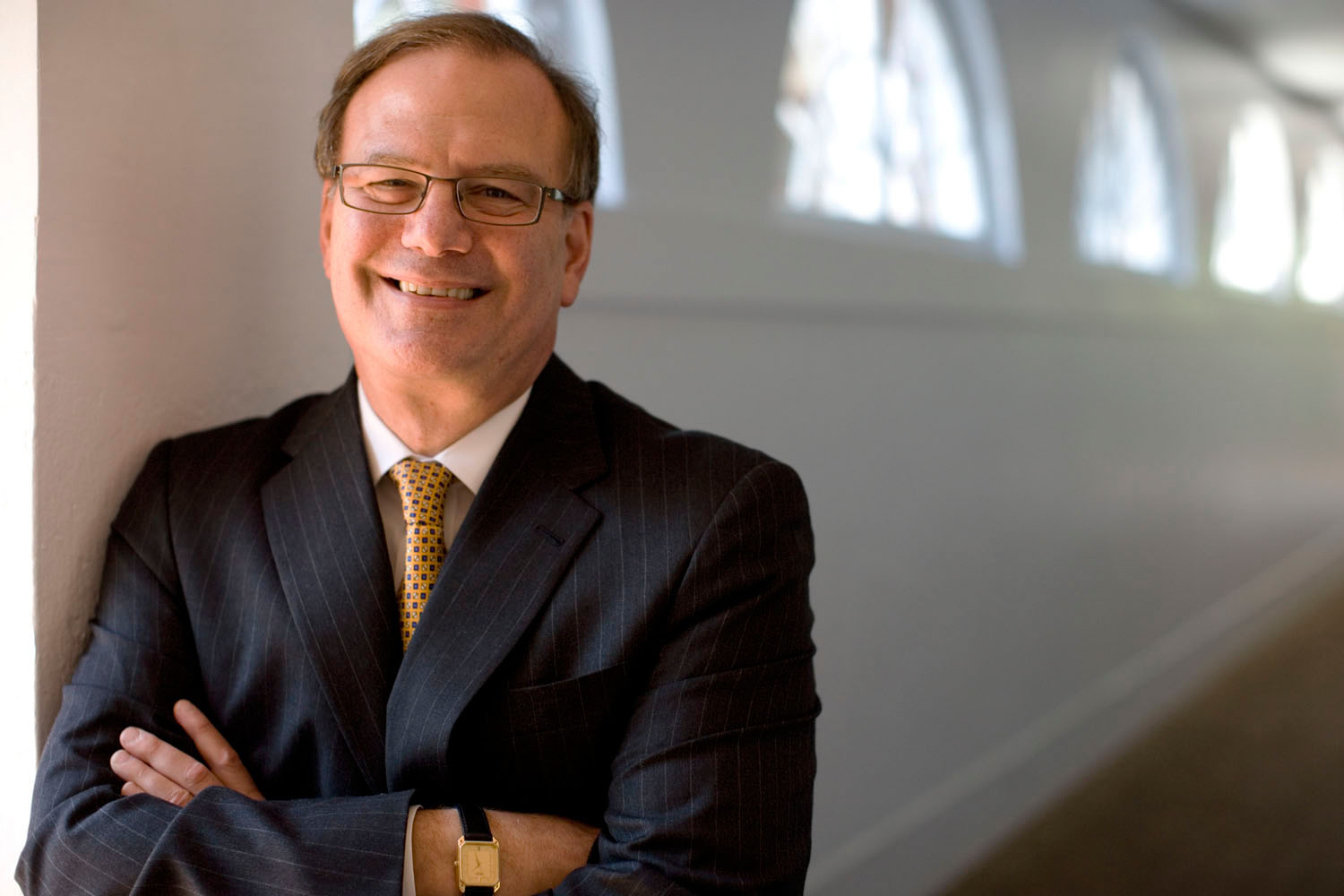 Interim Executive Director: Steven DeKosky, M.D.
Interim Executive Director: Steven DeKosky, M.D.
The McKnight Brain Institute of UF enjoyed a productive 2015. The UF-wide campaign to recruit preeminent investigators in multiple fields of research continued, and neuroscience was one of the most successful domains of this effort, with nine preeminent scholars joining UF. The MBI has helped support many of these recruitments through funding, space and instrumentation. New labs established in the MBI last year include those of H. Lee Sweeney, Ph.D. (Pharmacology); Elisabeth Barton, Ph.D. (Applied Physiology and Kinesiology); Gordon Mitchell, Ph.D. (Physical Therapy); David Tran, M.D., Ph.D. (Neurosurgery); and Carol Mathews, PhD (Psychiatry). Wet labs were also upgraded for Brian Hoh, MD (Neurosurgery) and Jeremy McIntyre, Ph.D. (Neuroscience). We enthusiastically welcome these additions to the MBI.
Another influential recruitment for UF and the MBI in 2015 was Steven T. DeKosky, M.D., a prominent leader in cognitive aging and Alzheimer’s disease research. Dr. DeKosky (Neurology) joined us as deputy director of the institute in July and began serving as interim director of the MBI in December. Dr. DeKosky is a former vice president and dean at the University of Virginia College of Medicine, as well as former chair of the Department of Neurology and director of the Alzheimer’s Disease Research Center at the University of Pittsburgh. We are very excited to have Dr. DeKosky with the MBI.
We also have tremendous gratitude to our outgoing executive director, Tetsuo Ashizawa, M.D., who recently stepped down. Dr. Ashizawa’s leadership of the MBI over the past five years was instrumental to the growth and success of basic and translational brain and neuroscience research at UF, and he oversaw a number of organizational and resource improvements at the institute.
A major announcement last year for UF Health was the awarding of funding for the 1Florida Alzheimer’s Disease Research Center, or ADRC, at UF (and Mt. Sinai Hospital in Miami Beach). Todd Golde, M.D., Ph.D. (Neuroscience), who is director of the Center for Translational Research in Neurodegenerative Disease, or CTRND, is now also director of the ADRC. The NIA-Alzheimer Centers comprise a network of research centers across the U.S., funded by the National Institute on Aging and the National Institutes of Health, and are a mark of excellence in cinical and basic research care, and outreach in Alzheimer’s disease and related dementias. Investigators at the centers aim to turn research into better diagnosis, care and therapies for people with Alzheimer’s disease. The UF/Mount Sinai center will be the only fully staffed ADRC located in Florida, and one of only 30 in the U.S. This is a major boost to MBI-supported neurodegenerative programs.
With significant funding from the McKnight Brian Research Foundation, the MBI, in conjunction with the Institute on Aging, helps support UF’s Age-related Memory Loss Program and the Cognitive Aging and Memory – Clinical Translational Research Program, or CAM-CTRP. These programs, directed respectively by Tom Foster, Ph.D. (Neuroscience), and Ron Cohen, Ph.D. (Aging), showed great progress last year. The new Evelyn F. McKnight Endowed Chair for Clinical Translational Research was established for Dr. Cohen in July 2015, and Sara Burke, Ph.D. (Neuroscience) obtained R01 funding for her research in age-related memory decline. Both programs participated in the eighth annual interinstitutional meeting of the MBRF, and their cross-institutional Epigenetics and Bio-informatics Core (operating in the MBI) completed data collection for studies examining gene transcriptions across three regions of the hippocampus. This core acts as a catalyst for discoveries across all four McKnight Brain Institutes in the U.S.
Through the state of Florida’s Brain and Spinal Cord Injury Research Trust Fund, the MBI has provided ongoing support to spinal cord injury, traumatic brain injury (TBI) and ischemic stroke research programs at UF. This funding led to several NIH grant submissions in 2015.
The Brain Tumor Immunotherapy Program, or BTIP, funded in large part by the Lillian S. Wells Foundation and by matching funds from UF and the MBI, recruited the aforementioned Dr. Tran, as well as Ashley Ghiassedin, M.D., and Eduardo Davila, Ph.D., (both Neurosurgery) to help expand its comprehensive translational neuro-oncology research program. The BTIP, led by Duane Mitchell, M.D., Ph.D. (Neurosurgery), is focused on the development of novel immunotherapeutic treatments for pediatric and adult brain tumors, and was awarded two new NIH R01s last year.
The MBI’s Advanced Magnetic Resonance Imaging and Spectroscopy facility, part of the National High Magnetic Field Lab, began offering dissolution dynamic nuclear polarization capabilities for in vivo studies on their 4.7 and 11.1 T MRI/S systems, and upgraded several other instruments. AMRIS, directed by Joanna Long, Ph.D. (Biochemistry), also submitted a high-end instrumentation grant seeking funds to add a second research-dedicated 3T MR Imaging instrument to the facility, which would include the latest advancements in MRI technology.
The MBI’s Cell and Tissue Analysis Core, directed by Ed Scott, Ph.D. (Molecular Genetics and Microbiology), added a new Nikon A1R Multiphoton confocal microscope to its instrumentation offerings. This roughly $1 million acquisition was made possible by a shared instrumentation grant awarded to Habibeh Khoshbouei, Ph.D. (Neuroscience), and additional funds from the MBI and COM. The exciting new instrument includes state-of-the-art N-STORM Super Resolution capability and allow researchers to acquire fluorescent images below the traditional “diffraction barrier” down to a resolution of approximately 20 nm.
On May 4, renowned neuroscientist and UF alumnus Fred H. Gage, Ph.D., returned to campus to deliver the 2015 William G. Luttge Lectureship in Neuroscience. The Lectureship, funded by the MBRF in tribute to the late “Bill” Luttge, Ph.D. (founding director of the MBI), is held annually to explore inventive ideas and approaches to ensure healthy cognitive aging and to counter brain diseases. Dr. Gage’s lecture, titled “Neuronal Plasticity and Genomic Diversity,” was delivered to a packed audience at the MBI and focused on the evolutionary impact of mobile DNA, which can cause a host of genetic variations and mutations by changing places in the genome.
With a year full of progress and accomplishments recently ended, the MBI looks forward to a promising 2016, a year which will bring us continued innovation and advancements toward discovering how the normal brain operates, and how we can repair it following injury, disease or aging.
UF Health Shands (Shands Teaching Hospital and Clinics Inc.)
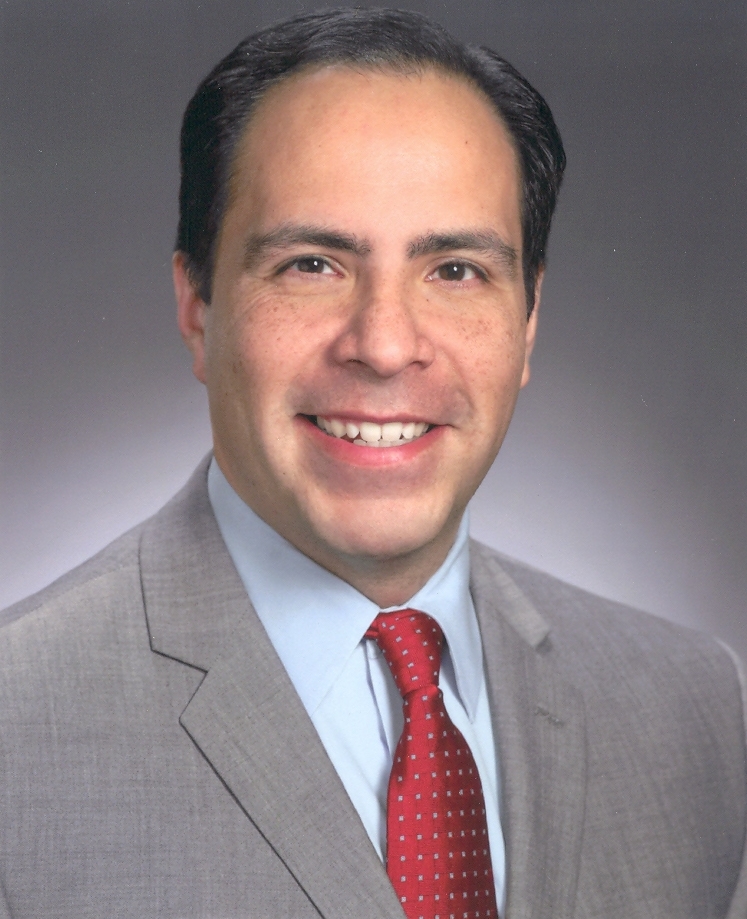 CEO: Ed Jimenez, M.B.A.
CEO: Ed Jimenez, M.B.A.
Like all of our counterparts across UF Health, we take great pride in our 2015 accomplishments at UF Health Shands. As we continue to improve and grow, we celebrate what got us here — the hard work of nearly 9,000 talented employees. They reflect our commitment to patient care and help us stay focused on the journey ahead and the fact that we are, first and foremost, a pillar in our community.
Patient care quality remains Job 1. We are focused on achieving even higher quality and safety measures and enhancing the patient experience. Hospitality and service training continued throughout 2015; nearly 11,500 UF Health faculty and staff have taken the training to date. It’s part of our continued effort to ensure that we provide the best experience for our patients, visitors and colleagues. Now we’re rolling out the next step. Starting in February, Hospitality Huddles will officially make their debut at UF Health Shands, the UF College of Medicine, UF Health Physicians and our UF Health core service departments. We also awarded 19 “Great Catch Awards” to individual staff and teams who went above and beyond to prevent a possible medical error and protect our patients.
In March, the UF Health Cancer Center was recognized as a state-designated Cancer Center of Excellence by Gov. Rick Scott and the Florida Department of Health. Our cancer experts remain dedicated to improving the lives of patients suffering from this relentless disease.
Over the summer, U.S. News & World Report released its annual list honoring the best hospitals and children’s hospitals in the nation, and we earned a top 50 ranking in 14 medical specialties — seven pediatric and seven adult. No other hospital in Florida is even close and only 25 hospitals in the U.S. have more than 14 ranked specialties. It’s an external validation that our teams are producing spectacular results on a national level.
Later in the spring, UF Health Shands Hospital received Baby-Friendly designation by Baby-Friendly USA, a global initiative of the World Health Organization and UNICEF that recognizes birthing facilities that implement specific breastfeeding procedures. We became the first hospital in North Central Florida to earn this important designation. It shows our dedication to creating a culture that empowers new mothers to provide their babies with the best care possible.
By the end of 2015 we learned that our LifeQuest Organ Procurement Organization facilitated the donation of 148 organs, which led to 432 organs transplanted. Both of these results were the highest ever recorded at UF Health Shands. Beyond the numbers, each case is truly life-changing for the patient and his or her family. And across all of our transplant programs we have made notable improvements in quality, volumes and access.
On the people front, there were notable moments in 2015. At the March Milestones celebration, 708 UF Health Shands employees who achieved 10, 15, 20, 25, 30, 35 and 40 years of service were celebrated. Bea Cameron celebrated 45 years with us — WOW! In April, we learned that UF Health was included in Forbes’ first-ever “America’s Best Employers” listing. Out of thousands of employers in the country, across all industries, we were honored to be one of the 500 employers on the list (which included only 30 health systems). We are proud that the workplace we’ve created feels more like a family than a corporate environment. By the end of 2015, more than 900 of our nurses achieved advanced certification in their fields. And our nurses also reached new heights in their academic pursuits, making 16 presentations at national meetings, participating in 15 active research studies and publishing several professional practice articles.
As our volumes continued to increase, our expert doctors, nurses and clinical and support staff at UF Health Shands worked diligently to serve our patients. In fiscal year 2015, our teams managed 54,156 hospital admissions; 111,057 E.R. visits; 765,118 hospital-based outpatient visits; and 4,862 UF Health ShandsCair emergency transports. Meanwhile, UF Health Physicians faculty practices tracked 791,488 outpatient visits. These numbers are impressive and reflect the dedication of everyone in clinical and support roles.
It is hard not to notice that the new UF Health Heart & Vascular Hospital and UF Health Neuromedicine Hospital are well into construction. The facility remains on pace to open in 2018 and will feature 216 beds (including 120 ICU beds), 20 state-of-the-art ORs and a new 600-space parking garage for patients and visitors. The structure will top out soon and crews will begin work on the internal infrastructure in the coming months. We are thrilled to create facilities that match the talent, expertise and commitment of our care teams. To date, we have raised nearly $9 million from generous supporters for the project.
In December, we broke ground on our second freestanding E.R — the UF Health Shands Emergency Center – Kanapaha on Southwest Archer Road. This new facility reflects our commitment to our community and will bring high-quality care closer to area residents.
On the external front, we continue to be proud of the partnership with Orlando Health, and if you’ve traveled in the Orlando area you have likely seen the UF Health Cancer Center name on buildings or in ads. In 2015, UF Health formed affiliations with Halifax Health in Daytona Beach, to launch a collaborative heart and vascular surgery network; and with CareSpot, expanding our community’s access to urgent care and held to the same quality standards as all of our UF Health practices.
Once again in 2015, patients from all 67 counties in Florida sought care at our hospital, likely remaining as the only hospital with this distinction — we are truly the state’s hospital. This was complemented by the fact that our colleagues at UF Health Physicians have confirmed that patients with a home ZIP code from each state in the country were seen at UF Health.
All of our successes and accomplishments are thanks to our staff, faculty and volunteers. Each day our colleagues make a difference in the lives of our patients with skilled and selfless work. I am proud to be a part of the UF Health family and am honored to work alongside each and every one. We have so much to be proud of and the future is bright. As we move forward, grow and build on our successes, we remain focused on what matters most — our patients. We have a great team and Go Gators!
UF Health Jacksonville
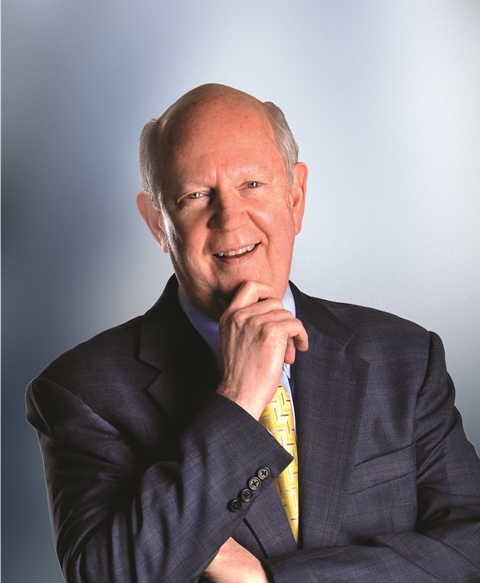 CEO: Russell E. Armistead, M.B.A.
CEO: Russell E. Armistead, M.B.A.
In May, UF Health announced our updated strategic plan, “The Power of Together” with a simultaneous announcement in Jacksonville and Gainesville. It is our plan for the future and follows our “Forward Together,” which was announced the same day five years prior. UF Health’s “No Two Alike” brand campaign began this year. We have engaged the Jacksonville Civic Council, a group of 70 business leaders in Jacksonville, and their Task Force is reviewing our mission, operations and impact on Jacksonville. This review is still underway, but we believe the Jacksonville Civic Council will fully support us both locally and in Tallahassee during this coming legislative session. For the second year in a row, we were the “TPC Charity of the Day” for THE PLAYERS Championship tournament. This national event provides great visibility for UF Health. We distributed more than 30,000 UF Health-branded bottles of sunscreen at the entrances to the tournament. It was a fun day and event. The Rita Golf Tournament and TraumaOne’s “A Night for Heroes” events continue to be successful, raising over $250,000 last year for our programs.
UF Health North – Phase 1
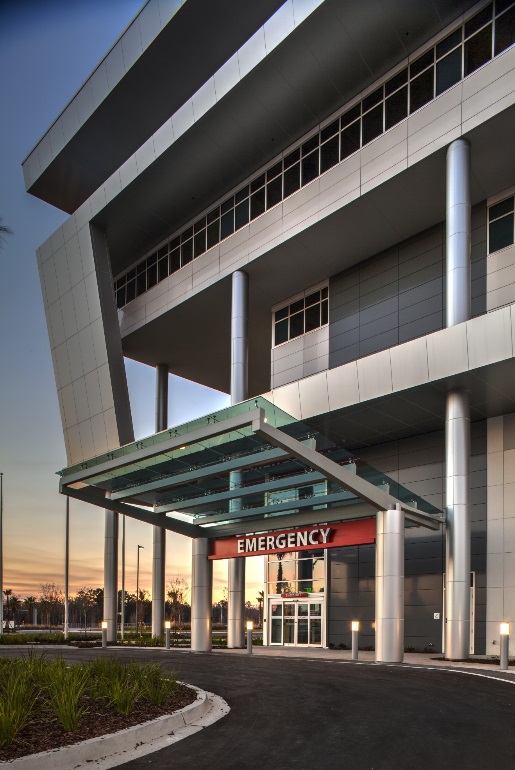 UF Health North opened as planned on Feb. 17, 2015. It is the only outpatient medical complex of its kind in North Jacksonville, complete with a full-service emergency department, advanced imaging and outpatient surgery suites. More than 20 specialty services are available through University of Florida physicians. A high-field open MRI scanner is one of the new diagnostic imaging services. This scanner delivers the same quality images as a traditional MRI, but improves patient comfort.
UF Health North opened as planned on Feb. 17, 2015. It is the only outpatient medical complex of its kind in North Jacksonville, complete with a full-service emergency department, advanced imaging and outpatient surgery suites. More than 20 specialty services are available through University of Florida physicians. A high-field open MRI scanner is one of the new diagnostic imaging services. This scanner delivers the same quality images as a traditional MRI, but improves patient comfort.
Volumes at UF Health North have far exceeded expectations. There were 24,769 visits in the emergency department from its opening through November 2015. These emergency department visits resulted in 2,575 admissions to UF Health Jacksonville. During the same time period, there were 33,674 radiology encounters. Outpatient surgery began operations March 2, 2015, with a total of 1,731 procedures performed through November 2015. We also opened a new rehabilitation services practice on April 6, 2015, and have performed 2,878 treatments through November 2015.
 Excellent care and exceptional service have resulted in very high patient satisfaction scores, with the emergency department and radiology both consistently ranking above the 90th percentile. We have also received hundreds of positive comments like these:
“Nurse, doctor and facility were just fantastic – you cannot compare; I have another surgery (coming up) and I’m looking forward to it.”
Excellent care and exceptional service have resulted in very high patient satisfaction scores, with the emergency department and radiology both consistently ranking above the 90th percentile. We have also received hundreds of positive comments like these:
“Nurse, doctor and facility were just fantastic – you cannot compare; I have another surgery (coming up) and I’m looking forward to it.”
“Every part of it, from the time I went in to the time I got in the car to go home – it was almost like a vacation in Florida; excellent all the way around, make you feel comfortable, positive place and people are very well-trained.”
UF Health North Hospital Groundbreaking
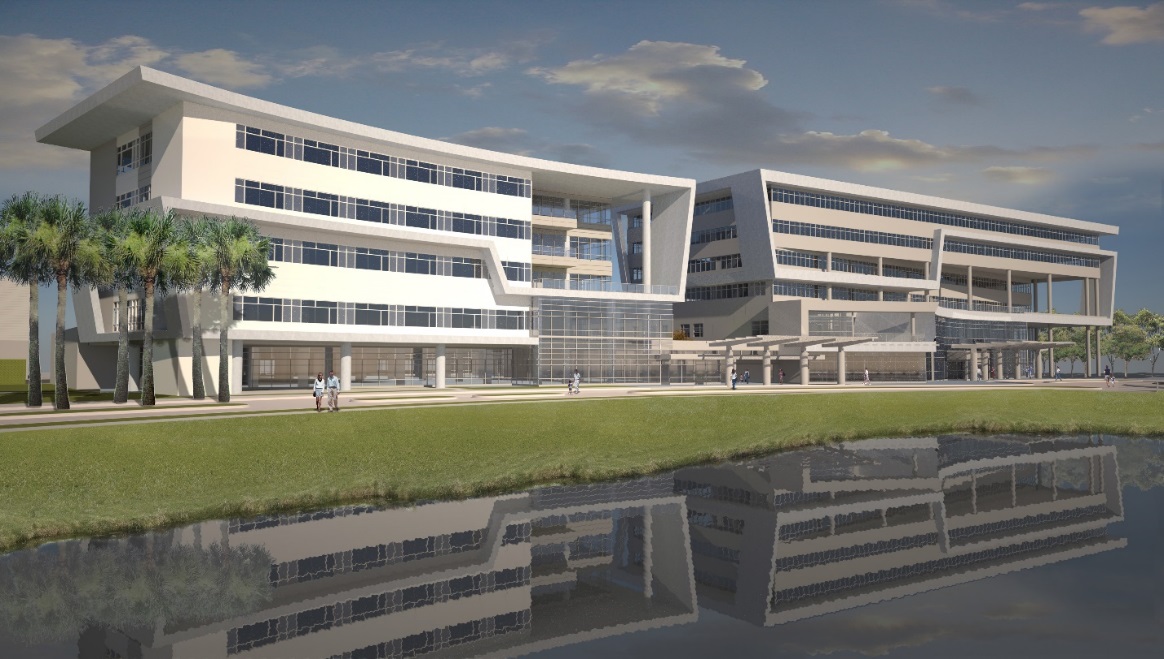
UF Health faculty and staff, as well as local elected officials and other community leaders, attended a groundbreaking ceremony for our 92-bed inpatient tower on Nov. 16, 2015. The new five-story, 160,000-square-foot facility will feature all-private rooms and will adjoin the outpatient medical complex. Specifically, there will be a 12-bed labor and delivery unit, an eight-bed women’s services unit, a 24-bed intensive care/step down unit and two 24-bed general acute care units. Once completed in mid-2017, UF Health North will be the only hospital in North Jacksonville, providing state-of-the-art medical services for residents of northern Duval County, Nassau County and Southeast Georgia.

Quality – Joint Commission
Quality and patient safety continue to be the major focus. The nation’s leading accreditor of health care organizations, The Joint Commission, named UF Health Jacksonville a 2014 Top Performer on Key Quality Measures. UF Health Jacksonville was recognized in The Joint Commission’s 2015 annual report, “America’s Hospitals: Improving Quality and Safety,” for achieving and sustaining excellence in five different categories: heart attack, heart failure, pneumonia, surgical care and perinatal care. Fewer than a third of eligible hospitals in the United States achieved this distinction.
TraumaOne Program 30-Year Milestone
We celebrated the 30th anniversary of the TraumaOne program last year. TraumaOne was founded in 1985, when UF Health Jacksonville was known as University Medical Center. Today, our three helicopters are stationed strategically at Lake City, St. Augustine and Yulee — ready to fly at a moment’s notice. Expanding our program geographically enables us to reach patients quickly and provide lifesaving treatment while they are being flown to UF Health Jacksonville or other facilities. Approximately 1,000 patients are flown annually from North Florida and South Georgia for critical care.
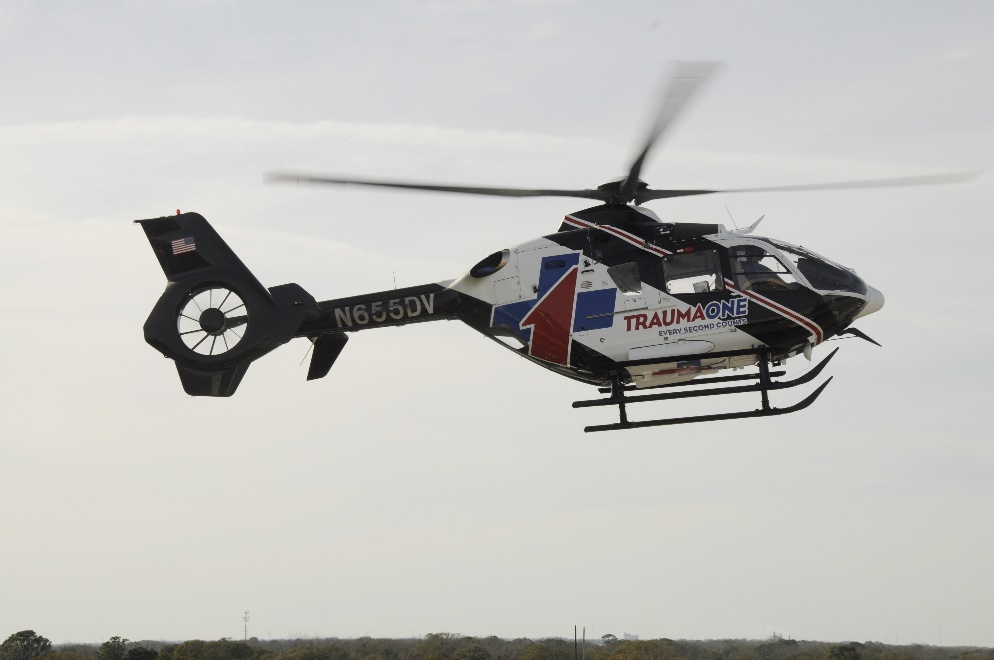
Finances
During 2015, we continued our financial improvement and successfully developed new sources of revenue to strengthen our organization. Since opening in February, UF Health North has generated a steady stream of admissions to our main campus from the new E.R.
We successfully issued $85 million of tax-exempt bonds in December to fund the construction of the 92-bed inpatient tower at UF Health North. Although we added additional debt to our balance sheet, we were able to maintain our investment-grade credit rating, which reduced our cost of capital.
Oncology Services Expansion
UF Health Jacksonville entered into an agreement with a large oncology group (21st Century Oncology) to open several off-campus infusion therapy centers. The first two locations opened mid-2015 and are already making a positive financial contribution. The remaining three locations will open the first quarter of 2016. From surgery and infusion to radiation and proton therapy, UF Health provides oncology services at more locations than any other hospital in the city.
The breadth and depth of the achievements of faculty and staff at our academic health center, as summarized in this “Year in Review,” is always humbling and inspiring. During a period of growth in size, scope and stature, which we have had the privilege to experience, each year’s accomplishments are even more humbling and more inspiring. It doesn’t get old! And we have not reached a plateau! Indeed, building on the amazing progress highlighted across all of our colleges, research institutes and hospitals, I am confident that the best is yet to come. I wish you all the very best for 2016, and look forward to working with you to achieve our goals.
Power of Together,
David S. Guzick, M.D., Ph.D. Senior Vice President for Health Affairs President, UF Health
About the author
